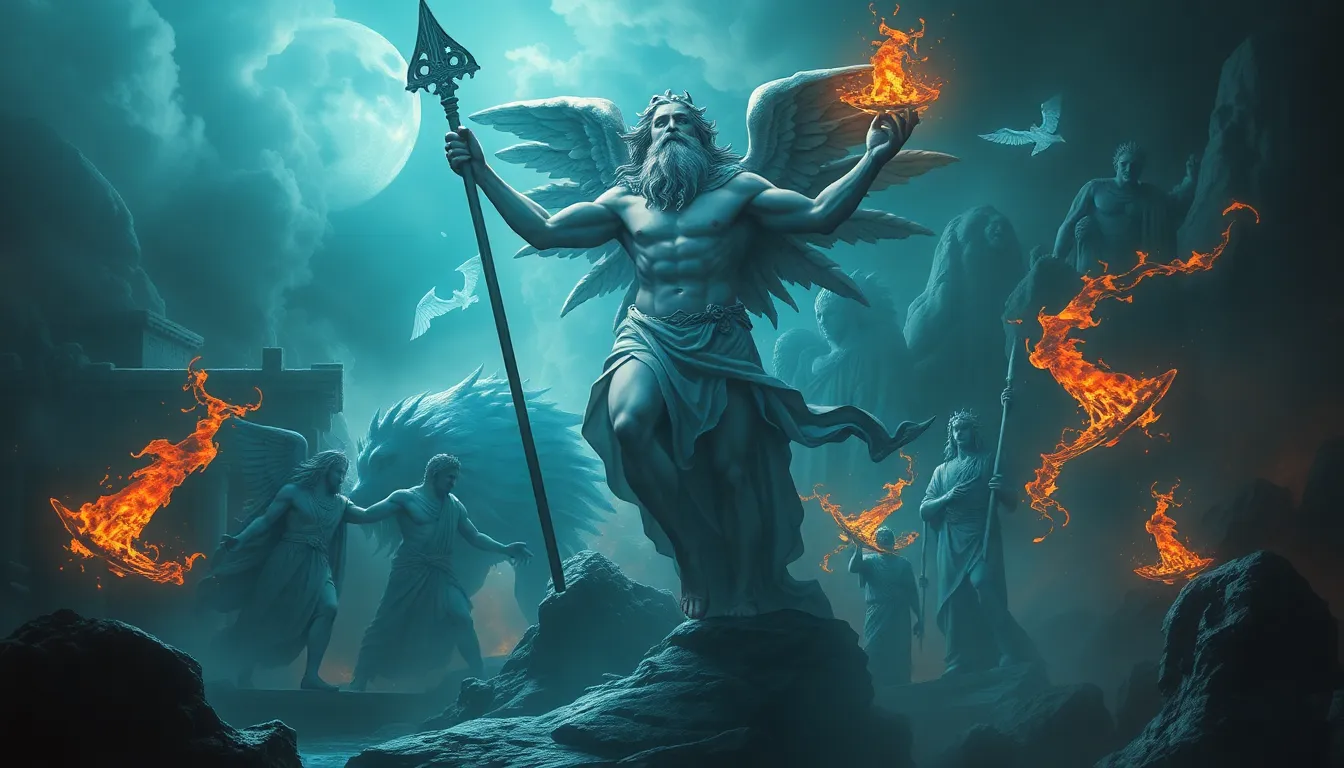The Role of Divine Retribution in the Myths of the Titans
I. Introduction
In the realm of mythology, divine retribution refers to the punishment inflicted by deities upon mortals or other divine beings for transgressions against divine law or moral order. This concept is prevalent in many cultures, serving as a reminder of the consequences of hubris and disobedience.
The Titans, a powerful race of deities in Greek mythology, represent the primordial forces of nature and the universe. They were the predecessors of the gods of Olympus and played a crucial role in the ancient narrative of creation and power struggles. The purpose of this article is to explore the theme of divine retribution as it manifests in the myths surrounding the Titans, highlighting key stories and characters that illustrate this fundamental aspect of Greek mythology.
II. The Concept of Divine Retribution
Divine retribution is deeply rooted in ancient belief systems, reflecting the idea that the gods uphold moral order in the universe. In these narratives, actions have consequences, and transgressions against the divine will often result in severe punishment.
The moral framework established by the gods includes expectations of behavior, respect for authority, and adherence to cosmic laws. Violating these principles often leads to retribution, which serves to maintain balance and justice.
For context, divine retribution can also be observed in other mythologies:
- Norse Mythology: The punishment of Loki for his betrayal of the gods.
- Egyptian Mythology: The consequences faced by Set for his murder of Osiris.
- Hindu Mythology: The various avatars of Vishnu coming to restore dharma by punishing adharma.
III. Titans and Their Defiance Against the Gods
The Titans, including notable figures like Cronus, Atlas, and Prometheus, are characterized by their immense power and defiance against the Olympian gods. They often acted in opposition to divine law, setting the stage for the conflicts that would arise.
Key figures among the Titans include:
- Cronus: The leader of the Titans who overthrew his father, Uranus, only to be challenged by his own children.
- Atlas: Punished to hold up the sky for eternity as a consequence of his role in the Titanomachy.
- Prometheus: Known for stealing fire from the gods to give to humanity, he defied Zeus’s will and faced dire consequences.
Their actions against the Olympians not only highlight their ambition but also underscore the significance of divine law and the repercussions of rebellion.
IV. Instances of Divine Retribution Against the Titans
One of the most pivotal moments in the myths of the Titans is the Titanomachy, a ten-year war between the Titans and the Olympians. This conflict is a direct manifestation of divine retribution as the Olympians sought to reclaim power and assert their authority over the Titans.
The punishment of Cronus is a striking example of divine retribution. After being overthrown by his son Zeus, Cronus was cast into Tartarus, a deep abyss used as a dungeon of torment. This act served not only as a punishment for his tyranny but also as a warning to others who might challenge the divine order.
Additionally, Prometheus’s punishment for his defiance—being bound to a rock where an eagle would eat his liver daily—symbolizes the severe consequences of challenging the gods and the importance of obedience to divine will.
V. The Role of Zeus as Enforcer of Retribution
As the king of the gods, Zeus plays a central role in administering divine retribution. His character embodies the complexities of justice, balancing authority with mercy, and punishment with forgiveness.
Zeus’s motivations for punishing the Titans stem from a desire to establish a new order and protect humanity. His actions against the Titans were not merely personal vendettas but rather necessary steps to restore balance in the cosmos.
In many narratives, Zeus is depicted as both a ruler and a figure of justice, ensuring that those who defy divine law face the consequences of their actions, thus reinforcing the moral order of the universe.
VI. The Impact of Divine Retribution on Titan Myths
The stories of divine retribution in Titan myths convey essential moral lessons. They illustrate the importance of humility, respect for authority, and the dangers of overreaching ambition.
The cultural implications of these myths in ancient Greek society were profound. They shaped perceptions of justice and power, influencing how individuals viewed their relationship with the divine and the consequences of their actions.
Through the tales of the Titans, the Greeks communicated a worldview where justice was not arbitrary but rather a cosmic principle that governed both divine and mortal realms.
VII. Comparisons with Other Mythological Traditions
Divine retribution is a theme that transcends Greek mythology and can be found in various cultures around the world. In comparing these traditions, we can observe both similarities and differences:
- Norse Mythology: The harsh consequences for gods and giants alike highlight a similar moral fabric regarding justice.
- Egyptian Mythology: The weighing of the heart against the feather of Ma’at emphasizes the importance of moral behavior.
- Mesopotamian Mythology: The stories of Gilgamesh and his encounters with divine beings reflect themes of retribution and consequence.
These comparisons reveal universal themes of justice and consequence that resonate across cultures, emphasizing the human understanding of morality and retribution.
VIII. Conclusion
In summary, the role of divine retribution in the myths of the Titans serves as a crucial element in understanding Greek mythology. The punishment of the Titans illustrates the moral expectations set by the gods and the consequences of defiance against divine order.
The enduring legacy of these myths continues to inform contemporary discussions of justice and morality, reminding us of the timeless nature of these narratives.
Ultimately, the stories of the Titans and their encounters with divine retribution reflect fundamental truths about human nature, power, and the quest for justice that remain relevant in today’s world.




